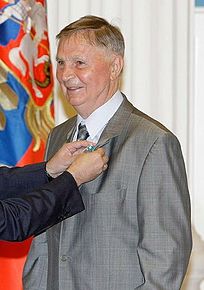Viktor Wassiljewitsch Tikhonow
| IIHF Hall of Fame , 1998 | |
|---|---|

|
|
| Date of birth | June 4th 1930 |
| place of birth | Moscow , Russian SFSR |
| date of death | November 24, 2014 |
| Place of death | Moscow , Russia |
| position | defender |
| Career stations | |
| 1949-1953 | WWS MWO Moscow |
| 1953-1963 | HK Dynamo Moscow |
Viktor Wassiljewitsch Tichonow ( Russian Виктор Васильевич Тихонов ; born June 4, 1930 in Moscow ; † November 24, 2014 ibid) was a Soviet - Russian ice hockey coach and player and was considered the best coach in the world. His son Vasily , who died in 2013, was also an ice hockey player and coach, while his grandson Wiktor is a professional ice hockey player.
Career
Tikhonov began his career as a hockey player at CSKA Moscow . At the age of 30 he turned to coaching. He coached the youth team of Dynamo Moscow ; after eight years he took over the Daugava Riga ice hockey team as head coach. With them he rose from the third division to the elite league of the Soviet Union.
In 1976 he moved to CSKA Moscow and won 13 championship titles with them in the Soviet ice hockey league and 13 titles in the European Cup by 1989 . At the same time he was coach of the Soviet national team (Sbornaja) and colonel in the Soviet Army. With this team he won eight world championship titles , three Olympic gold medals, ten European championship titles and the Canada Cup in 1981 . His biggest defeat was probably the game against the USA at the 1980 Winter Olympics , which the Soviet national team lost 3-4. This match went down in ice hockey history as the Miracle on Ice .
With his first row, which was used by both CSKA Moscow and the national team, he had formed what is probably the best European five-a-side block that has ever played ice hockey. Behind the so-called KLM series , consisting of Sergei Makarow , Igor Larionow and Wladimir Krutow , stood the two defenders Alexei Kassatonow and Vyacheslav Fetissow .
In the early 1990s, the political situation in the former Soviet Union changed. The players were now able to play in the NHL . Tikhonov's training system broke down as the players defended themselves.
At the Olympic Games in 1994 Tikhonov was the last time coach of the Sbornaya, as this was only fourth and he then had to leave. He was also fired from CSKA Moscow in 1996. He also had a brief comeback on the boards of the Russian national ice hockey team at the 2004 men's ice hockey world championship . Due to the poor result (10th place), however, he was canceled again, also at ZSKA.
In 1998 he was honored with induction into the IIHF Hall of Fame . Tikhonov died on November 23, 2014 in his native Moscow at the age of 84.
Sporting successes
- 1976–2004: Coach at CSKA Moscow (Red Army Club) 13 times national champions (Soviet league), 13 times European Cup winner
- 1976–1992: coach of the Soviet national ice hockey team
- Olympic gold: 1984, 1988, 1992.
- Olympic silver: 1980.
- Ice Hockey World Championship Gold: 1978, 1979, 1981, 1982, 1983, 1986, 1989, 1990.
- Ice Hockey World Championship silver: 1987.
- Ice Hockey World Championship bronze: 1985, 1991.
- European ice hockey championship champions: 1978, 1979, 1981, 1982, 1983, 1985, 1986, 1987, 1989, 1991.
- Canada Cup : 1976 (3rd place), 1981 (winner), 1984 (3rd place), 1987 (2nd place), 1991 (5th place)
Quotes from Tikhonov
"A player who is not ready to constantly improve and does not want to win every game, no matter how unimportant, will never be great!"
Web links
- Gerhard Hofer: Olympic ice hockey: 7: 3 - Canada shoots Russia . In: The press . February 25, 2010.
- Wolfgang Gärner: Ice hockey - prisoner of freedom . In: Süddeutsche.de . May 19, 2010.
- Wiktor Tichonow at eishockeymuseum.de
Individual evidence
- ^ William Yardley: Viktor Tikhonov, Soviet Hockey Coach, Dies at 84. In: The New York Times . November 24, 2014 (accessed November 25, 2014).
| personal data | |
|---|---|
| SURNAME | Tikhonov, Viktor Wassiljewitsch |
| ALTERNATIVE NAMES | Tikhonov, Viktor; Tikhonov, Viktor; Тихонов, Виктор Васильевич |
| BRIEF DESCRIPTION | Soviet-Russian ice hockey coach |
| DATE OF BIRTH | June 4th 1930 |
| PLACE OF BIRTH | Moscow |
| DATE OF DEATH | November 24, 2014 |
| Place of death | Moscow |